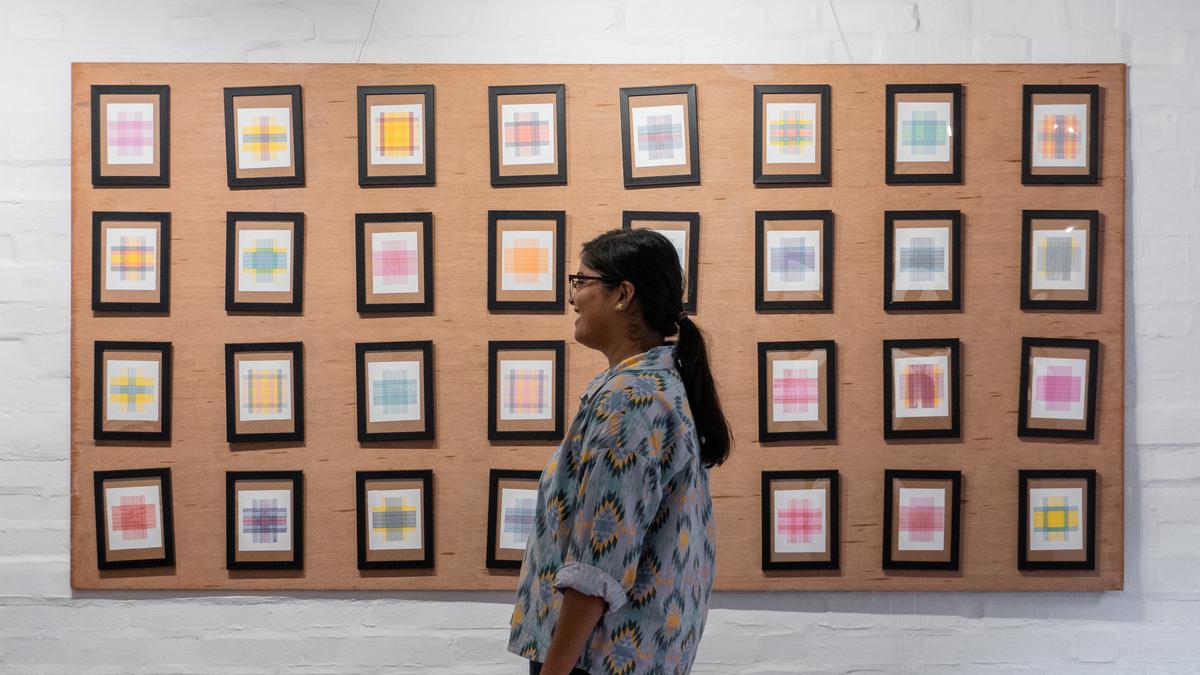
Chennai’s House of Thinai launches travelling exhibition linking Madras checks and generative art technology
The Hindu
Alongside championing jamakalam and Lambadi embroidery on furniture, House of Thinai’s latest initiative links Madras checks and generative art technology
In late August this year, as the city was commemorating Madras Month, a fortnight-long exhibition titled ‘Past Forward’ concluded at DakshinaChitra that took a deep dive into ‘the trans-oceanic cultural legacy and future of Madras Checks’. “The exhibition merged traditional weaving techniques with generative models, enhanced by computational interlace algorithms, creating a unique platform for visitors to interact and co-create,” says Karthik Prema Rajakumar, founder-partner, House of Thinai — known for its handcrafted furniture and decor — and also the brain behind Past Forward.
Now a travelling exhibition, Karthik, 28, says the project (supported by the Center for Collaborative Arts and Media, at Yale and the TSAI Center for Innovative Thinking at Yale) will come to Bengaluru in January 2025 and a few other Indian cities before concluding at Yale late next year.
“This research initiative explores, documents, and continually observes the connection between craft communities practising Madras checks, and generative art technology,” he says. He adds that visitors at the DakshinaChitra exhibition designed their own Madras Checks patterns and colours, “which will be included in the exhibition’s expanding online digital collection”.
These designs, says Karthik, will be co-created with handloom artisans and will travel to North America for a parallel exhibition. “We’ve developed an algorithmic generative model (https://www.madras-checks.com/generator) and made it live. Now, using this design generator we are looking forward to co-produce newer designs with the Madras Checks weaving artisans which is underway, and hopefully use them as furniture upholstery,” he explains.
This exhibition is the latest addition to Thinai Foundation’s design archives that comprises research on craft and its communities, folk worship and lore. Karthik calls House of Thinai a “research-manufacture unit”, that he runs with Mano Ranjan who looks after the day-to-day operations and logistics of the studio, and Sheikh Ahmed,the Foundation, and design partner.
“We occasionally have individuals on board to help us with textiles, patterns, and other requirements ,” he says, adding that they work out of their studio at Red Hills. Their latest launch is a contemporary day-bed, a take on ‘kaithu-kattil’ or ‘charppai’. “From ideating the design to identifying the artisans and materials (wood, brass, organic cotton belt, and cashew shell oil), the process of its creation with artisans was exciting,” says Kartik.
Elaborating on the recently-launched jamakkalam series, he adds, “The idea was to combine fine wood craftsmanship and textile artistry to design a product that would be equally utilitarian, as aesthetic. This led to circling back to the time-worn easy chair typology of furniture. The collapsible nature of furniture is designed to fold into a single silhouette thereby making it a frame in which the textile art is fitted. This could ultimately be placed on a wall or hung up on a vertical surface, while also being an easy chair when needed,” he says.













